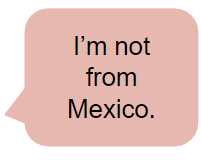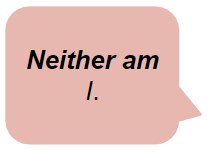What is the negative sentence structure you use when you agree with someone?
Give a response agreeing with the statement below.

neither + auxiliary verb + subject

Name all the comparative and superlative adjectives for the irregular adjectives below.


Make an example sentence using the future simple.
Various examples are acceptable!
(Ex. It’s raining so I won’t walk to the park today. I’ll start reading more this year.)
What are the 4 different ways we can express the future?
We can use future simple, be going to, present simple, and present continuous.
(If they name other tenses, that are correct, that's fine!)
When do we use the future continuous tense?
It's used for a long, continuous action that is happening in the future.
What does the future perfect simple express?
Expresses an action that will be finished by a specific time in the future.
Make a sentence with the timeline below. (Day 3 represents how long the action has been going on.)

It’ll have been snowing for three days by tomorrow.
What's a trick you can use if you can't figure out the auxiliary verb for your sentence?
Turn the sentence into a question!
Give an example of a negative superlative adjective in a sentence. (Hint: What's the opposite of the most?)
Various answers are acceptable!
(Ex. That's the least interesting movie I've seen. Mine is the least complicated assignment.)
Make an example sentence using be going to.
Various answers are acceptable!
(Ex. I am going to walk to school. They aren’t going to watch the football match.)
When do we use the present continuous to express the future?
It can be used to talk about future plans or arrangements that are solid.
How do we form a question in the future continuous? Make an example.
will + subject + be + verb -ing
Various examples are acceptable!
(Ex. Will he be taking an exam that day? Will you be helping us tonight?)
What are some common prepositions and phrases we use with this tense? Just name 4.
by this time, from now, as soon as, at, by, when
(Bonus points if they list more!)
What does the future continuous tense express?
Expresses an action that will continue up until a specific time in the future.
Make an affirmative sentence for a disagreement statement.
Affirmative Sentence: but + subject + auxiliary + not
Various answers are acceptable!
(Ex. He loves football, but I don’t. We went to the party, but they didn’t.)
What's the difference between comparative and superlative adjectives?
Comparative Adjectives compare one noun to another.
Superlative Adjectives compare two or more nouns to the most.
Complete the statements below:
* Be going to is used for plans/decisions that......
* Future simple is used for plans/decisions that.....
have been made earlier; were made in that moment.
How do you make it clear that the future is being expressed when you use the present continuous tense?
You either have to use a time reference or it has to be clear in context.
(Bonus points if they name both ways!)
Various answers are acceptable!
(Ex. He won’t be practicing piano. It won’t be snowing outside then.)
Make an example sentence in the future perfect simple using the timeline below.

The train will have left before you get there.
Make an example sentence in the future perfect continuous, negative form.
Various answers are acceptable!
(Ex. They won’t have been running for the next two hours. He won’t have been cleaning the house by this evening.)
Look at the sentence below. Is it a negative or affirmative sentence?
We don’t have a dog, but they do.
Negative
We don't have a dog.
What's the difference in meaning between the two sentences below?
1. The movie was entertaining.
2. I was entertained by the movie.
1. It was an entertaining movie.
2. I felt entertained.
Give two uses of future simple and two uses of be going to.
Future simple: 1) A quick offer/decision, made in the moment without thinking about it before. 2) A prediction that’s usually an opinion. 3) Can express a promise.
Be going to: 1) A decision or intention you’ve already made. Something you’ve thought about. 2) A prediction based on present evidence. 3) Plans you’ve already made.
(Bonus points if they name more that what is required!)
When is present simple used to express the future? Give an example.
It's used for a scheduled event/appointment.
Various answers are acceptable for the example!
(Ex. I have a dentist appointment this afternoon. The train arrives in the next half hour.)
What is the difference between these two sentences, other than the tenses?
1. My jacket is too small. I’ll buy a new one.
2. I’ll be shopping all day.
1. This is an unplanned decision that was made in the moment.
2. This is a more certain plan that is long and continuous.
You can sometimes use the future simple instead when the sequence of events is clear. Turn the sentence below into the future simple tense.
We will have arrived before you get to the airport.
We will arrive before you get to the airport.
What are the meanings of the sentences below?
I will have lived here for ten years.
We will have been living here for ten years.
The meanings are the same. They both share how the speaker has lived "here" for ten years.
What's an informal way to agree with what someone says? Give an example.
By responding with "Me too!" or "Me neither!"
Various examples are acceptable.
What's the difference between an adjective ending in -ed vs. one ending in -ing?
-ing: Describes a noun’s characteristic. It’s active, so the noun is “doing” something.
-ed: Expresses how someone feels. It’s passive, so something has been done to the noun to cause a certain state.
Various answers are acceptable!
(Ex. I will call you next week. I promise! AND I heard thunder earlier. It’s going to rain.)
Make an example sentence using the present continuous to express the future.
Various answers are acceptable!
(Ex. They’re meeting tomorrow at school. Are we going to the movies tonight?)
What's the biggest difference between the future simple and the future continuous?
The biggest difference is with future continuous there is no intent, it’s like an obligation. Things happen because they have to happen.
Give an example sentence in the future perfect simple, question form.
Various answers are acceptable!
(Ex. Will she have taken all her exams by the start of summer? Will you have cleaned the house before the guests arrive?)
What are some verbs that wouldn't make sense to use with the future perfect continuous? Just name 4.
Stative verbs: think, know, seem, prefer, like, concern, need, see, want, hear, etc.
(Bonus points if they give more!)